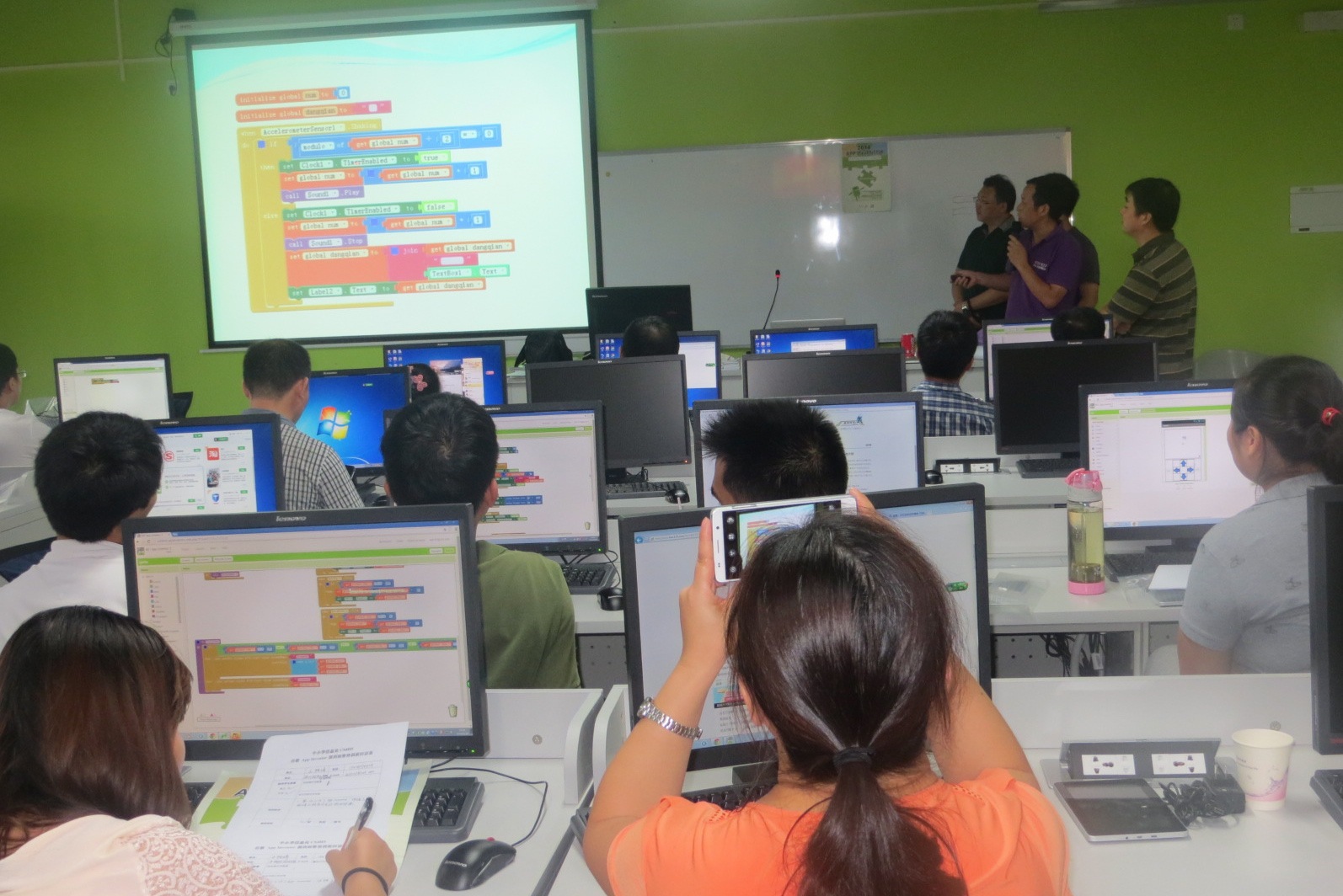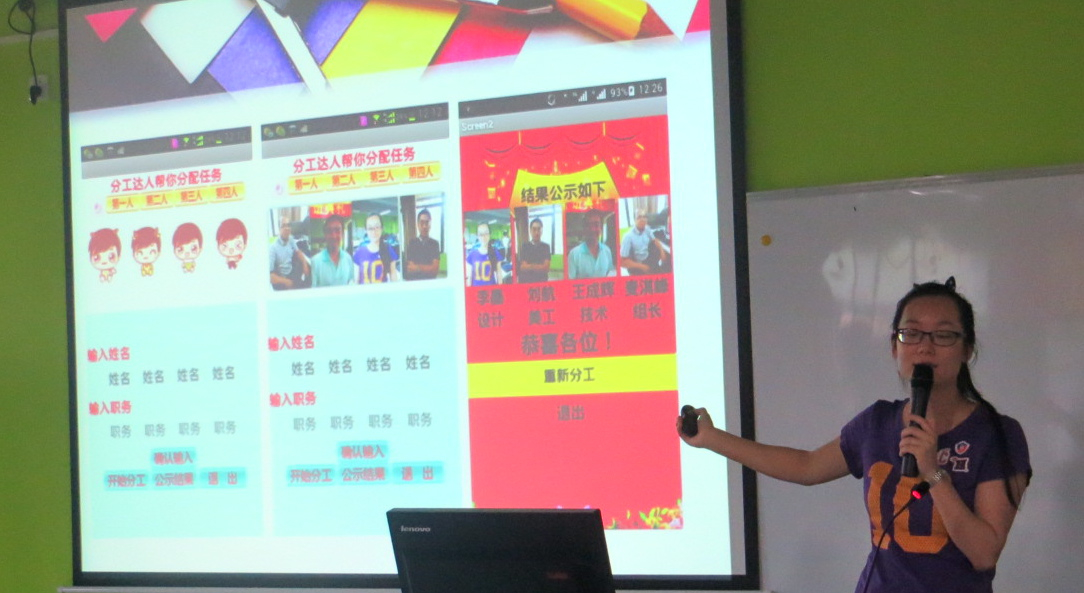App Inventor teacher workshops in South China
Jul 31, 2014 hal's Blog
Shenzhen, Guangdong Province, China
July, 2014
I’m writing from an App Inventor workshop at the Shenzhen Institute of Information Technology,Shenzhen Institute of Information Technology (SZIIT), one of China’s top technical schools, where we’re running a three-day App Inventor workshop for 40 middle school and high school teachers. “We” are MIT Masters students Weihua Li and Brian Sun, rising sophomores Helen Nie and Nicole Lu, and me. Here with us is Kathy Deng from Google China Education in Beijing.
This workshop is part of a program co-sponsored by Google Education and the MIT MISTI China. Google is funding 14 Chinese universities this summer to run App Inventor workshops for K-12 teachers. The MIT students are running six of them, of which I'm participating in two: this one in Shenzhen, and one last week for 80 teachers in Guangzhou at South China University of Technology (SCUT), where we were joined by Sean Gilbert, Managing Director of the MIT China Program, and Aimin Zhu, head of Google Education China. Overall, there will be several hundred Chinese K-12 teachers participating in App Inventor training at the MIT-Google workshops this summer.
Our host here at SZIIT is Prof. Wang Yingfeng, Director of the School of Software, who has published a book on App Inventor that’s used at the school. None of us at MIT had known about this book. Nor did we know, as Prof. Wang told us the other day, that all 2000 entering students at SZIIT study App Inventor in their introduction to computing. In Guangzhou, our host, Prof. Li Yue, also teaches App Inventor at SCUT, and she is about to publish her own App Inventor book.
The workshops follow the overall pattern we use in the US: the teachers start the first day by making simple apps from the MIT tutorials: "Pet the Kitty" and "Magic 8-Ball". The second day moves to "Whac-A-Mole" and "Grandma, I Love You," a cute example from Prof. Li’s forthcoming book, about a girl who creates an app to send to her grandmother as a digital greeting card. Some of the teachers were uncomfortable with our teaching style, which left them to work through the examples on their own using written guides, while we came around and answered questions and coached. The teachers said they found this way of working unfamiliar and preferred more step-by-step guidance through the examples. I don’t know whether this reflects just the preferences of those teachers, or whether there’s a general contrast between Chinese education and MIT’s more freewheeling style; definitely something to explore further.
The work with App Inventor is punctuated by talks by the MIT students about the genesis of App Inventor, about life at MIT (classes, hacking, activities) and about their own experiences as a high-school students in the US. Towards the end of the second day we ask the teachers to form teams of three or four and create original apps. We give them a template for a 5-minute slide presentation and show them how to connect their phones to screencast software so they can include live demos of the apps when they present.
The third day is for work on projects in the morning, with the afternoon devoted to team presentations. Most of these teachers started with App Inventor only two days ago and the projects are impressive: a sliding picture puzzle, mass texting, and trivia games quizzes. There are also tools for their own use as teachers: math quizzes, grade books, and a system for managing student team assignments. Some of the applications are familiar, some are novel. But in general, but there's a special quality about the way these teachers go about the work, paying a careful attention to design to embellishing screens with cute cartoon-style artwork that gives the apps a distinctively Chinese look.
 |
 |
| Teachers present their projects at the Shenzhen workshop. | Shenzhen primary school teacher Li Ting presents her team’s project: an app to help teachers assign students to work in groups and keep track of each group’s progress. |
Attending these workshops is a real high for me. It's gratifying to see the progress with App Inventor. I’m proud of the MIT students. It's no simple task to be dropped halfway around the world to lead a multi-day technical project course in an unpredictable environment with unknown technical obstacles. App Inventor in particular uses Google cloud services. These became blocked by the Chinese governmen's "Great Firewall of China" just two weeks before the workshops were to start.Making it possible for the workshops to happen at all required some fancy last-minute reconfiguration of our MIT service. Even with reconfiguring, the on-site networking infrastructure at the universities was challenging. Hint for those running future workshops in China: Bring wireless routers.
It's exhilarating to see the enthusiasm for App Inventor in these Chinese workshops. It's as if, more so than in the U.S., there's a hunger here to touch mobile computing and make it one's own, and a deeper appreciation for the goal of democratizing mobile technology that was the stimulus for App Inventor's creation. My exhilaration is mixed with a twinge of guilt that others others working on the App Inventor team can't see for themselves the tremendous pleasure and intellectual stimulation their work is giving to so many people on the other side of the globe.







